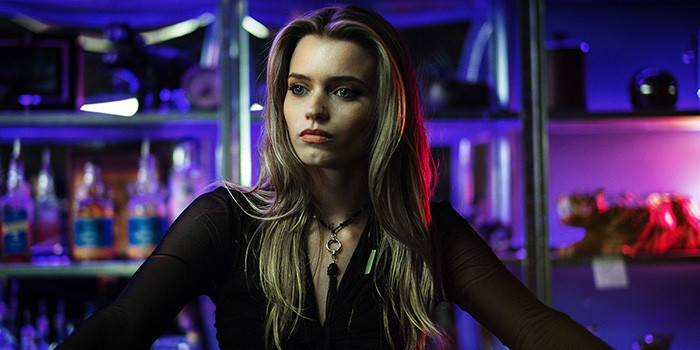Before diving into a review of Outlaws, the latest entry into the biker gang film subgenre, it’s almost impossible to ignore the elephant in the room: Sons of Anarchy. The shadow of Kurt Sutter’s television epic looms large over any contemporary portrayal of outlaw motorcycle clubs. Initially, the intention was to judge Stephen McCallum’s film on its own merits, free from comparisons to such a zeitgeist-defining series. However, Matt Nable’s script quickly invites those very comparisons, perhaps even intentionally. Outlaws centers on the Copperheads Motorcycle Club, where the “should-be” leader Paddo (Ryan Corr) aims to legitimize the club, clashing with the returning, violently inclined president, Knuck (played by Nable himself). This central conflict mirrors the core tension of Sons of Anarchy, immediately placing Outlaws within a well-trodden narrative territory of Biker Gang Films.
The strength of television, particularly in the realm of biker gang sagas like Sons of Anarchy, lies in its expansive format. Television series afford the time to meticulously develop characters, solidify motivations, and carefully construct intricate plotlines. Outlaws, constrained by a ninety-minute runtime, struggles to achieve this depth. The supposed father-son dynamic between Knuck and Paddo, crucial to their fractured relationship, is relegated to a single, almost throwaway line. This late reveal, arriving when their ideological rift is already irreparable, strains credibility. It becomes difficult to believe that these two men once shared any common ground. The film suggests that the intervening three years have been transformative, hardening Knuck into a paranoid, brutal leader threatened by the very man he entrusted with the club’s protection, while Paddo has grown weary of Knuck’s violence and seeks a more sustainable, business-oriented approach.
Where Outlaws particularly stumbles in comparison to the richer tapestry of Sons of Anarchy is in its portrayal of female characters. In Sons, Gemma Teller Morrow is a complex, maternal figure whose motivations, while often morally ambiguous, are deeply rooted in family and loyalty. In contrast, the women in Outlaws, Knuck’s wife Hayley (Simone Kessell) and Paddo’s girlfriend Katrina (Abbey Lee), lack such nuance. Hayley doesn’t embody a conflicted maternal role towards Paddo, and Katrina isn’t an outsider seeking to pull her lover away from a life of crime. Instead, both women are depicted as almost entirely devoid of empathy, compassion, or any vision for a future beyond their own manipulative control. Hayley actively poisons Knuck’s mind against Paddo, while Katrina pushes Paddo towards a violent coup.
 Ryan Corr and Abbey Lee in Outlaws (2019)
Ryan Corr and Abbey Lee in Outlaws (2019)
These women are undeniably intelligent and strategic, positioned as puppet masters subtly manipulating events from behind the scenes. Nable and McCallum even emphasize this calculated agency towards the film’s conclusion. However, this reveal feels unearned because the film relies heavily on tired, sexist biker gang film tropes, limiting these women to little more than one-dimensional clichés. The introduction of Paddo’s simpleton brother, Skink (Josh McConville), further exacerbates this issue. Skink serves as a catalyst for the escalating conflict between Knuck and Paddo, embodying the destructive force of the “old guard” versus “new guard” tension. More problematically, Skink often acts directly upon the suggestions of Hayley and Katrina, while the supposedly more rational male characters waver and hesitate.
The film, therefore, fails to subvert machismo; it reinforces it. Paddo and Knuck seem to pull back from direct conflict with each other, as if acknowledging a line they are unwilling to cross in their brotherhood, hesitant to sacrifice their bond for the sake of women. Skink, the conveniently dim-witted character whose sole purpose seems to be to create chaos, becomes the linchpin in Hayley and Katrina’s manipulative scheme. Sensitivity and naiveté are strangely conflated through Skink and Noisy (Sam Parsonson), the latter playing a central role in another of the film’s missteps: its handling of homophobia.
Beyond the pervasive misogyny that reduces Katrina and Hayley to stereotypical sirens wielding love as a weapon for power, Outlaws also incorporates a deeply problematic subplot of homophobia. It’s revealed that Knuck has had same-sex experiences in prison that extend beyond mere survival. However, instead of exploring this revelation for meaningful commentary on masculinity and sexuality within biker culture, the film resorts to reinforcing toxic masculinity. Knuck’s same-sex affair is presented as more deplorable than other forms of betrayal, aligning with a narrow, prejudiced view rather than using it as an opportunity for nuanced storytelling.
While one could argue this portrayal is “realistic” to certain elements within MC culture, reflecting the homophobia that may exist, simply depicting such prejudice without critical examination feels irresponsible in contemporary filmmaking. The film flirts with glorifying this lifestyle, presenting it as inherently cinematic and dramatic. By showcasing the characters’ constant undermining and power struggles as “cool” or intriguing, while simultaneously marginalizing homophobia as a mere consequence of “manhood,” Outlaws sends a conflicting and ultimately damaging message. Particularly when juxtaposed with the emphasis on “brotherly love” between Paddo and Skink, and the respect between Paddo and his loyal followers, the film inadvertently equates homosexuality with betrayal and fails to offer any counter-narrative.
Aside from these thematic shortcomings, Outlaws is technically competent. Scenes like the tense opening encounter between Paddo and rival club leader Sugar (Aaron Pedersen) are engaging, even if plot threads, such as the consequences of Skink’s actions in that scene, are later dropped. Lee and Kessell deliver solid performances despite their characters’ two-dimensionality. Corr and Nable are equally effective as men grappling with internal conflict, though their characters are ultimately defined by their loyalty to the club above personal conviction. Without exploring the deeper nuances of these internal wounds, Outlaws is likely to appeal primarily to a narrow audience already immersed in the biker lifestyle and seeking a violent, albeit shallow, cinematic experience.
Grade: C-
